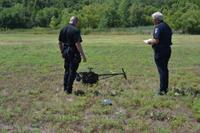-
L.A County to turn rain water into drinking water
Residents of Los Angeles County know that on the rare occasion that it rains, staying away from the beach is a good idea. Runoff from rain typically brings heavy metals, pesticides, cigarette butts, animal waste, and other pollutants into the streams and rivers which go into the Pacific Ocean. Now, local officials are getting together to find a solution to the water pollution and water scarcity, with an ambitious plan to make the runoff water drinkable.
-
-
California city could become first in the state to ban drones
The City Council in Rancho Mirage, California was set to vote yesterday on a proposal which would ban the use of drones in residential areas in the city. If it passes, it will be the first law of its kind in the state. The ordinance would ban the flying of “unmanned aircraft that can fly under the control of a remote pilot or by a geographic positions system (GPS) guided autopilot mechanism” up to 400 feet above areas that have been zoned residential.
-
-
Maryland’s new firearms safety law requires fingerprinting gun buyers

The Maryland House of Delegates passed a new law on Wednesday which will require the fingerprinting of gun buyers, mandate background checks, restrict availability of weapons to the mentally ill, and ban certain kinds of assault weapons and magazines of more than ten bullets.
-
-
Georgia town requires households to have firearms

Nelson, a Georgia town of fewer than 2,000 people, has passed a mandatory gun ownership law in an effort to lower the town’s crime rate. The city council unanimously passed the Family Protection Ordinance on Monday, requiring “heads of households to maintain firearms … in order to provide for the emergency management of the city.”
-
-
Aryan Brotherhood suspected in Texas prosecutors killings

The FBI and other law enforcement agencies believe the white supremacist group the Aryan Brotherhood could be behind the murders of a Texas district attorney and his wife last weekend, and the death of an assistant district attorney earlier this year.
-
-
Immigration violators spend long stretches in Washington jail
The Immigration and Customs Enforcement (ICE) can place holds on people booked into jail who may be in the United States illegally. A study of King County, Washington, jail data from 2011 found that about one in eight people with ICE holds were not charged with any crime. It also found that half of the inmates with holds were charged with misdemeanor crimes, including driving without a license. Moreover, if ICE has placed a hold on an individual in the King county jail, that individual will stay in jail an extra month on average. King county officials says all this costs the county too much money, and they want ICE to limit its holds for those who committed serious crimes.
-
-
U.S. to cut mineral payment to states by $110 million between now and August
The U.S. Department of Interior will cut its federal mineral payments to thirty-five states by $110 million due to the federal budget cuts. Different states will lose different amounts of money: Wyoming tops the list with $53 million in lost federal mineral payments over the next five months, while North Carolina is bringing up the rear, with the federal government cutting its mineral payments to the state by $7 (seven dollars) between now and August.
-
-
El Paso to hire more border officers to compensate for CBP budget cuts
In El Paso, Texas, more than 100,000 residents depend on the activity across the bridges which connect the United States to Mexico. This includes $80 billion in trade a year that crosses the El Paso bridges and millions of shoppers who cross our bridges who spend more than $1.4 billion in the El Paso economy. Sequestration-related cuts, by promising longer wait times at border crossings, will hurt the local economy, and the El Paso city council is looking for ways to minimize the damage.
-
-
Automakers help Detroit emergency services
General Motors, Ford Motors, and the Chrysler Group joined Blue Cross Blue Shield of Michigan, Quicken Loans, and several other businesses in the Detroit area to donate $8 million for new ambulances and police cars, on the same day that emergency manager Kevyn Orr started his job.
-
-
Pennsylvania Sheriff charged for making terrorist threats

A Pennsylvania sheriff was arrested and charged Monday for threatening to chop off a Democratic campaign worker’s hands, shoot a reporter, and intimidate witnesses.
-
-
Gun manufacturer to leave Colorado after governor signs gun bill

Colorado governor John Hickenlooper on Wednesday signed a state gun control bill which will expand background checks and limit ammunition magazine capacity. The measure is notable because Colorado has been considered a firearm-friendly state.
-
-
FAA gives Arlington, Texas police permission to use UAVs

The Federal Aviation Administration (FAA) has given the Arlington (Texas) Police Department permission to use two small helicopter UAVs. The FAA did lay out a set of rules for the police department to follow when using the drones.
-
-
Alabama wants to teach you how to deal with active-shooter situations
The Alabama Department of Homeland Security (ADHS) has paid for a series of billboards, informing the public there is a video on how to deal with an active shooter situation in a work place or other public settings.
-
-
NRC rejects plan for Maryland nuclear reactor
A plan to build a third nuclear reactor in southern Maryland was postponed last week as the Nuclear Regulatory Commission (NRC) upheld an earlier decision to squash the project. the primary reason for the rejection is the fact that the applicant’s parent company, Electricite de France, is 85 percent owned by the French government. U.S. law forbids foreign ownership of U.S. nuclear reactors.
-
-
Ex-DHS employee sues DHS Wyoming office
A Wyoming DHS employee s suing the Wyoming’s Office of Homeland Security for what he considers to be arbitrary change in his work conditions, changes which took a toll on his finances and family life.
-
More headlines
The long view
Smaller Nuclear Reactors Spark Renewed Interest in a Once-Shunned Energy Source
In the past two years, half the states have taken action to promote nuclear power, from creating nuclear task forces to integrating nuclear into long-term energy plans.
